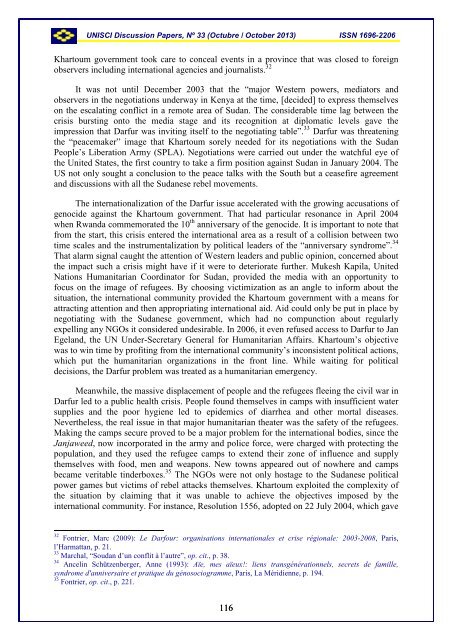UNISCI - Universidad Complutense de Madrid
UNISCI - Universidad Complutense de Madrid
UNISCI - Universidad Complutense de Madrid
Create successful ePaper yourself
Turn your PDF publications into a flip-book with our unique Google optimized e-Paper software.
<strong>UNISCI</strong> Discussion Papers, Nº 33 (Octubre / October 2013) ISSN 1696-2206Khartoum government took care to conceal events in a province that was closed to foreignobservers including international agencies and journalists. 32It was not until December 2003 that the “major Western powers, mediators andobservers in the negotiations un<strong>de</strong>rway in Kenya at the time, [<strong>de</strong>ci<strong>de</strong>d] to express themselveson the escalating conflict in a remote area of Sudan. The consi<strong>de</strong>rable time lag between thecrisis bursting onto the media stage and its recognition at diplomatic levels gave theimpression that Darfur was inviting itself to the negotiating table”. 33 Darfur was threateningthe “peacemaker” image that Khartoum sorely nee<strong>de</strong>d for its negotiations with the SudanPeople’s Liberation Army (SPLA). Negotiations were carried out un<strong>de</strong>r the watchful eye ofthe United States, the first country to take a firm position against Sudan in January 2004. TheUS not only sought a conclusion to the peace talks with the South but a ceasefire agreementand discussions with all the Sudanese rebel movements.The internationalization of the Darfur issue accelerated with the growing accusations ofgenoci<strong>de</strong> against the Khartoum government. That had particular resonance in April 2004when Rwanda commemorated the 10 th anniversary of the genoci<strong>de</strong>. It is important to note thatfrom the start, this crisis entered the international area as a result of a collision between twotime scales and the instrumentalization by political lea<strong>de</strong>rs of the “anniversary syndrome”. 34That alarm signal caught the attention of Western lea<strong>de</strong>rs and public opinion, concerned aboutthe impact such a crisis might have if it were to <strong>de</strong>teriorate further. Mukesh Kapila, UnitedNations Humanitarian Coordinator for Sudan, provi<strong>de</strong>d the media with an opportunity tofocus on the image of refugees. By choosing victimization as an angle to inform about thesituation, the international community provi<strong>de</strong>d the Khartoum government with a means forattracting attention and then appropriating international aid. Aid could only be put in place bynegotiating with the Sudanese government, which had no compunction about regularlyexpelling any NGOs it consi<strong>de</strong>red un<strong>de</strong>sirable. In 2006, it even refused access to Darfur to JanEgeland, the UN Un<strong>de</strong>r-Secretary General for Humanitarian Affairs. Khartoum’s objectivewas to win time by profiting from the international community’s inconsistent political actions,which put the humanitarian organizations in the front line. While waiting for political<strong>de</strong>cisions, the Darfur problem was treated as a humanitarian emergency.Meanwhile, the massive displacement of people and the refugees fleeing the civil war inDarfur led to a public health crisis. People found themselves in camps with insufficient watersupplies and the poor hygiene led to epi<strong>de</strong>mics of diarrhea and other mortal diseases.Nevertheless, the real issue in that major humanitarian theater was the safety of the refugees.Making the camps secure proved to be a major problem for the international bodies, since theJanjaweed, now incorporated in the army and police force, were charged with protecting thepopulation, and they used the refugee camps to extend their zone of influence and supplythemselves with food, men and weapons. New towns appeared out of nowhere and campsbecame veritable tin<strong>de</strong>rboxes. 35 The NGOs were not only hostage to the Sudanese politicalpower games but victims of rebel attacks themselves. Khartoum exploited the complexity ofthe situation by claiming that it was unable to achieve the objectives imposed by theinternational community. For instance, Resolution 1556, adopted on 22 July 2004, which gave32 Fontrier, Marc (2009): Le Darfour: organisations internationales et crise régionale: 2003-2008, Paris,l’Harmattan, p. 21.33 Marchal, “Soudan d’un conflit à l’autre”, op. cit., p. 38.34 Ancelin Schützenberger, Anne (1993): Aïe, mes aïeux!: liens transgénérationnels, secrets <strong>de</strong> famille,syndrome d'anniversaire et pratique du génosociogramme, Paris, La Méridienne, p. 194.35 Fontrier, op. cit., p. 221.116
















